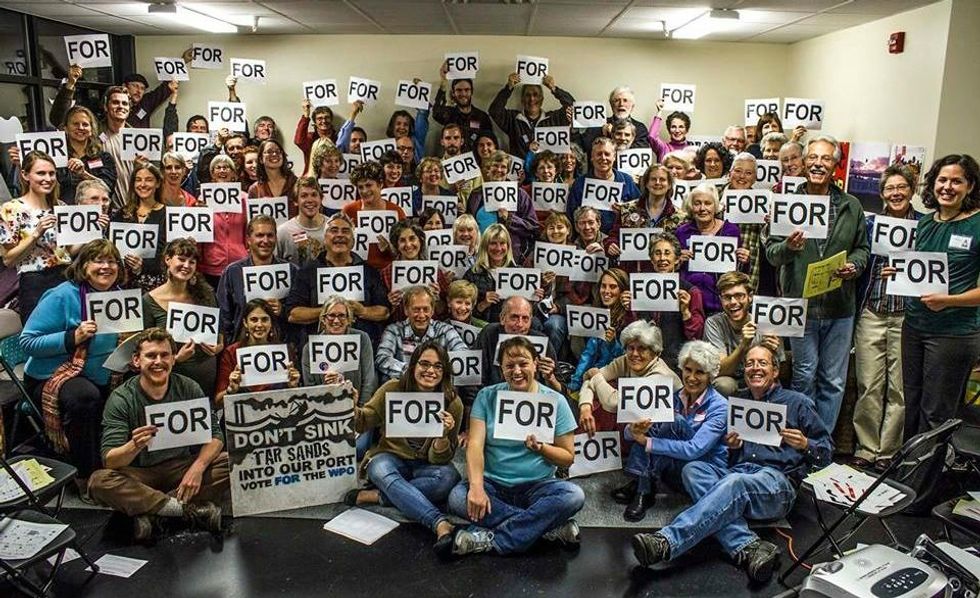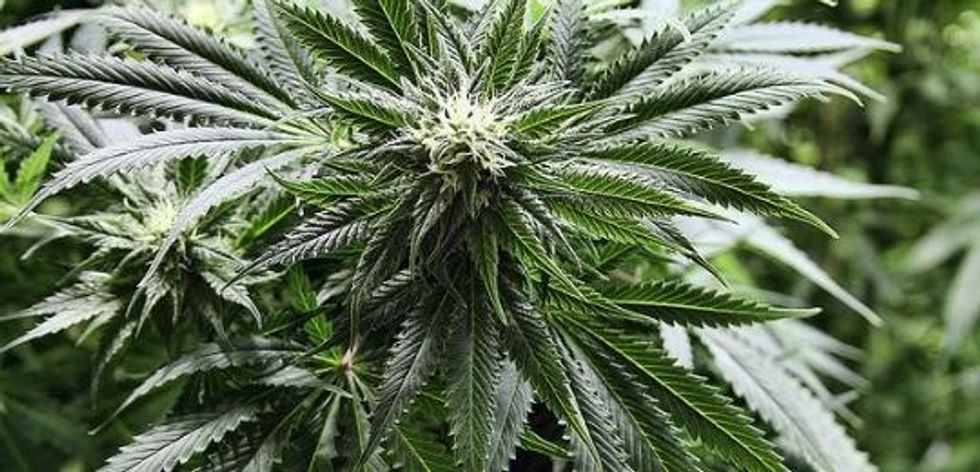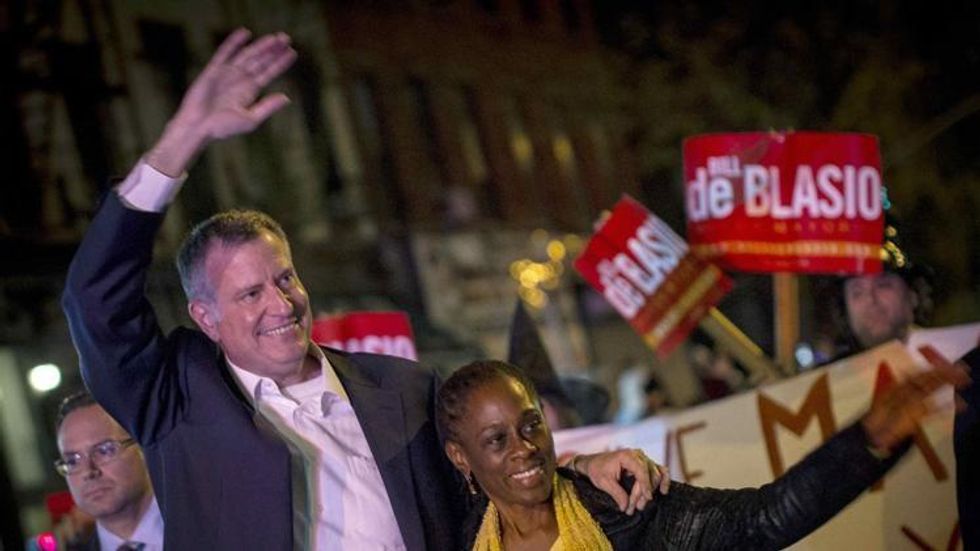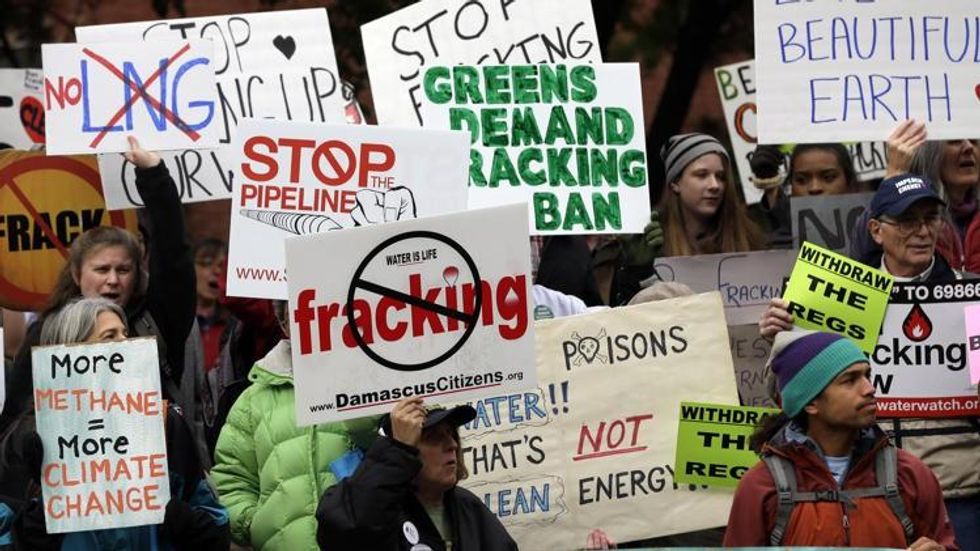Six Election Day Races to Watch
From tar sands to marijuana to GMOs, the nation's eyes are on Tuesday's elections
A tar sands showdown in a small town in Maine, a battle to label genetically modified foods in Washington and a fracking fight in Colorado are some of the issues to watch on Election Day.
Common Dreams zooms in on six hotly-contested battles poised to set a course for progressive politics:
Fight against corporate food lobby to label GMO foods in Washington State
Washington State's I-522 would require foods that have been genetically modified, or GMOs, to be labeled as such for retail purposes in the state.

Following legal pressure from anti-GMO campaign groups such as Moms for Labeling and Yes on 1-522 and the Washington State Attorney General's office, the pro-GMO trade group Grocery Manufacturers Association was forced to release a list of its high rolling donors who have financed the NO on I- 522 drive.
As was expected, major food corporations and GMO users such as PepsiCo, Nestle USA, The Coca-Cola Co. and General Mills, among many others, had secretly donated millions of dollars to the GMA campaign.
GMA spending made up $7 million of the $17 million dollar No on I-522 push.
A similar initiative in California, Proposition 37, lost on last year's ballot due to a similar flood of campaign money from pro-GMO food companies.
The following is the ballot text:
Initiative Measure No. 522 concerns labeling of genetically-engineered foods.
This measure would require most raw agricultural commodities, processed foods, and seeds and seed stocks, if produced using genetic engineering as defined, to be labeled as genetically engineered when offered for retail sale.
Should this measure be enacted into law?
Yes [ ]
No [ ]
Tar Sands Showdown in South Portland, Maine
Environmentalists are facing off with the tar sands industry in a hotly contested election in the coastal Maine town of South Portland. At issue is the Waterfront Protection Ordinance, a land-use zoning ordinance up for referendum Tuesday that would prevent oil industry efforts to build a massive tar sands export facility at the waterfront of this town of 25,000.

South Portland grassroots organizations are putting the ordinance to referendum in a proactive bid against industry plans to use a 70-year-old, 236-mile pipeline, currently employed to transport crude oil from freighters in the South Portland harbor to Montreal, to instead transport tar sands oil from Canada by reversing the flow of the pipeline. Under this industry scheme, tar sands oil would be distributed internationally by oil tankers and an 'upgraded' terminal in South Portland. The so-called upgrade would include two 70-foot smokestacks on the waterfront and storage tanks near local schools.
Big oil is throwing big money at the campaign, out-spending green groups six to one. "Oil industry spending is completely over the top," said Robert Sellin, from the group Protect South Portland, in a previous interview with Common Dreams. "Clearly they have all the money. We are talking about some of the wealthiest corporations in the world. They do not want a community to stand up for itself.
The election is poised to have nation-wide ramifications as the dirty oil industry looks for other options for tar sands transport in the face of nation-wide opposition to Keystone XL.
Legalization of recreational marijuana across four U.S. cities
If passed, Question One on the ballot in Portland, Maine would make it legal for adults 21 and over to possess -- but not purchase or sell -- up to 2.5 ounces of marijuana.

"I think there's national implications, keeping the momentum that Washington and Colorado started last November in ending marijuana prohibition," said David Boyer, the Marijuana Policy Project's political director in Maine. "This is just the next domino."
Likewise, ballot proposals in three Michigan cities, Lansing, Jackson and Ferndale, would amend city charters to legalize the use or possession of up to one ounce of marijuana on private property by anyone 21 years or older.
Tim Beck, a the chairman of the Safer Michigan Coalition, an organization working with local groups to pass new marijuana laws, told Michigan Live that he is confident voters in the three cities will vote to decriminalize marijuana, and may lead to wider reaching state ballots in the future.
Earlier this month a national Gallup poll showed that, for the first time, the majority of Americans want to legalize marijuana.
With 58 percent support, the number of those favoring the drug has jumped a dramatic 10 percentage points since November 2012--with the momentum showing "no sign of abating," Gallup notes.
Colorado's Proposition AA: The Marijuana Tax
Now that marijuana has been legal in Colorado for a year, residents are grappling over exactly how much to tax it. Colorado's Proposition AA, on the table for the Tuesday election, with hit marijuana with a 15 percent in excise tax, and 10 percent sales tax if passed. The taxes would pay for school construction and enforcement of marijuana law respectively.

Supporters of marijuana legalization fall on both sides of the issue. The 'No' campaign charges that the tax is excessive and will drive pot users back underground, and it is gaining support from some conservatives, including gubernatorial candidate Greg Brophy and former Senator John Andrews.
The 'Yes' side argues that, in order to build a national case for pot legalization, it is necessary to show the public just how socially beneficial this legalization can be. "Taxes are an opportunity for marijuana to show it can play a valuable role in the community," said Joe Megyesy, spokesman for the campaign promoting the tax measure, in an interview with the Associated Press.
Polls indicate the proposition will pass.

A de Blasio victory would mark the first Democratic mayor in the city in over 20 years.

Voters in Lafayette will vote on a ban of the fossil fuel extraction method, while the other three cities have a five-year moratorium on their ballots.
"Can the richest and most powerful industry on the planet -- which pollutes our air, water, land and neighborhoods -- also buy and pollute our local democracy in Fort Collins?" asked Gary Wockner of Save the Poudre and Clean Water Action. "We'll find out."
_____________________
An Urgent Message From Our Co-Founder
Dear Common Dreams reader, The U.S. is on a fast track to authoritarianism like nothing I've ever seen. Meanwhile, corporate news outlets are utterly capitulating to Trump, twisting their coverage to avoid drawing his ire while lining up to stuff cash in his pockets. That's why I believe that Common Dreams is doing the best and most consequential reporting that we've ever done. Our small but mighty team is a progressive reporting powerhouse, covering the news every day that the corporate media never will. Our mission has always been simple: To inform. To inspire. And to ignite change for the common good. Now here's the key piece that I want all our readers to understand: None of this would be possible without your financial support. That's not just some fundraising cliche. It's the absolute and literal truth. We don't accept corporate advertising and never will. We don't have a paywall because we don't think people should be blocked from critical news based on their ability to pay. Everything we do is funded by the donations of readers like you. Will you donate now to help power the nonprofit, independent reporting of Common Dreams? Thank you for being a vital member of our community. Together, we can keep independent journalism alive when it’s needed most. - Craig Brown, Co-founder |
A tar sands showdown in a small town in Maine, a battle to label genetically modified foods in Washington and a fracking fight in Colorado are some of the issues to watch on Election Day.
Common Dreams zooms in on six hotly-contested battles poised to set a course for progressive politics:
Fight against corporate food lobby to label GMO foods in Washington State
Washington State's I-522 would require foods that have been genetically modified, or GMOs, to be labeled as such for retail purposes in the state.

Following legal pressure from anti-GMO campaign groups such as Moms for Labeling and Yes on 1-522 and the Washington State Attorney General's office, the pro-GMO trade group Grocery Manufacturers Association was forced to release a list of its high rolling donors who have financed the NO on I- 522 drive.
As was expected, major food corporations and GMO users such as PepsiCo, Nestle USA, The Coca-Cola Co. and General Mills, among many others, had secretly donated millions of dollars to the GMA campaign.
GMA spending made up $7 million of the $17 million dollar No on I-522 push.
A similar initiative in California, Proposition 37, lost on last year's ballot due to a similar flood of campaign money from pro-GMO food companies.
The following is the ballot text:
Initiative Measure No. 522 concerns labeling of genetically-engineered foods.
This measure would require most raw agricultural commodities, processed foods, and seeds and seed stocks, if produced using genetic engineering as defined, to be labeled as genetically engineered when offered for retail sale.
Should this measure be enacted into law?
Yes [ ]
No [ ]
Tar Sands Showdown in South Portland, Maine
Environmentalists are facing off with the tar sands industry in a hotly contested election in the coastal Maine town of South Portland. At issue is the Waterfront Protection Ordinance, a land-use zoning ordinance up for referendum Tuesday that would prevent oil industry efforts to build a massive tar sands export facility at the waterfront of this town of 25,000.

South Portland grassroots organizations are putting the ordinance to referendum in a proactive bid against industry plans to use a 70-year-old, 236-mile pipeline, currently employed to transport crude oil from freighters in the South Portland harbor to Montreal, to instead transport tar sands oil from Canada by reversing the flow of the pipeline. Under this industry scheme, tar sands oil would be distributed internationally by oil tankers and an 'upgraded' terminal in South Portland. The so-called upgrade would include two 70-foot smokestacks on the waterfront and storage tanks near local schools.
Big oil is throwing big money at the campaign, out-spending green groups six to one. "Oil industry spending is completely over the top," said Robert Sellin, from the group Protect South Portland, in a previous interview with Common Dreams. "Clearly they have all the money. We are talking about some of the wealthiest corporations in the world. They do not want a community to stand up for itself.
The election is poised to have nation-wide ramifications as the dirty oil industry looks for other options for tar sands transport in the face of nation-wide opposition to Keystone XL.
Legalization of recreational marijuana across four U.S. cities
If passed, Question One on the ballot in Portland, Maine would make it legal for adults 21 and over to possess -- but not purchase or sell -- up to 2.5 ounces of marijuana.

"I think there's national implications, keeping the momentum that Washington and Colorado started last November in ending marijuana prohibition," said David Boyer, the Marijuana Policy Project's political director in Maine. "This is just the next domino."
Likewise, ballot proposals in three Michigan cities, Lansing, Jackson and Ferndale, would amend city charters to legalize the use or possession of up to one ounce of marijuana on private property by anyone 21 years or older.
Tim Beck, a the chairman of the Safer Michigan Coalition, an organization working with local groups to pass new marijuana laws, told Michigan Live that he is confident voters in the three cities will vote to decriminalize marijuana, and may lead to wider reaching state ballots in the future.
Earlier this month a national Gallup poll showed that, for the first time, the majority of Americans want to legalize marijuana.
With 58 percent support, the number of those favoring the drug has jumped a dramatic 10 percentage points since November 2012--with the momentum showing "no sign of abating," Gallup notes.
Colorado's Proposition AA: The Marijuana Tax
Now that marijuana has been legal in Colorado for a year, residents are grappling over exactly how much to tax it. Colorado's Proposition AA, on the table for the Tuesday election, with hit marijuana with a 15 percent in excise tax, and 10 percent sales tax if passed. The taxes would pay for school construction and enforcement of marijuana law respectively.

Supporters of marijuana legalization fall on both sides of the issue. The 'No' campaign charges that the tax is excessive and will drive pot users back underground, and it is gaining support from some conservatives, including gubernatorial candidate Greg Brophy and former Senator John Andrews.
The 'Yes' side argues that, in order to build a national case for pot legalization, it is necessary to show the public just how socially beneficial this legalization can be. "Taxes are an opportunity for marijuana to show it can play a valuable role in the community," said Joe Megyesy, spokesman for the campaign promoting the tax measure, in an interview with the Associated Press.
Polls indicate the proposition will pass.

A de Blasio victory would mark the first Democratic mayor in the city in over 20 years.

Voters in Lafayette will vote on a ban of the fossil fuel extraction method, while the other three cities have a five-year moratorium on their ballots.
"Can the richest and most powerful industry on the planet -- which pollutes our air, water, land and neighborhoods -- also buy and pollute our local democracy in Fort Collins?" asked Gary Wockner of Save the Poudre and Clean Water Action. "We'll find out."
_____________________
A tar sands showdown in a small town in Maine, a battle to label genetically modified foods in Washington and a fracking fight in Colorado are some of the issues to watch on Election Day.
Common Dreams zooms in on six hotly-contested battles poised to set a course for progressive politics:
Fight against corporate food lobby to label GMO foods in Washington State
Washington State's I-522 would require foods that have been genetically modified, or GMOs, to be labeled as such for retail purposes in the state.

Following legal pressure from anti-GMO campaign groups such as Moms for Labeling and Yes on 1-522 and the Washington State Attorney General's office, the pro-GMO trade group Grocery Manufacturers Association was forced to release a list of its high rolling donors who have financed the NO on I- 522 drive.
As was expected, major food corporations and GMO users such as PepsiCo, Nestle USA, The Coca-Cola Co. and General Mills, among many others, had secretly donated millions of dollars to the GMA campaign.
GMA spending made up $7 million of the $17 million dollar No on I-522 push.
A similar initiative in California, Proposition 37, lost on last year's ballot due to a similar flood of campaign money from pro-GMO food companies.
The following is the ballot text:
Initiative Measure No. 522 concerns labeling of genetically-engineered foods.
This measure would require most raw agricultural commodities, processed foods, and seeds and seed stocks, if produced using genetic engineering as defined, to be labeled as genetically engineered when offered for retail sale.
Should this measure be enacted into law?
Yes [ ]
No [ ]
Tar Sands Showdown in South Portland, Maine
Environmentalists are facing off with the tar sands industry in a hotly contested election in the coastal Maine town of South Portland. At issue is the Waterfront Protection Ordinance, a land-use zoning ordinance up for referendum Tuesday that would prevent oil industry efforts to build a massive tar sands export facility at the waterfront of this town of 25,000.

South Portland grassroots organizations are putting the ordinance to referendum in a proactive bid against industry plans to use a 70-year-old, 236-mile pipeline, currently employed to transport crude oil from freighters in the South Portland harbor to Montreal, to instead transport tar sands oil from Canada by reversing the flow of the pipeline. Under this industry scheme, tar sands oil would be distributed internationally by oil tankers and an 'upgraded' terminal in South Portland. The so-called upgrade would include two 70-foot smokestacks on the waterfront and storage tanks near local schools.
Big oil is throwing big money at the campaign, out-spending green groups six to one. "Oil industry spending is completely over the top," said Robert Sellin, from the group Protect South Portland, in a previous interview with Common Dreams. "Clearly they have all the money. We are talking about some of the wealthiest corporations in the world. They do not want a community to stand up for itself.
The election is poised to have nation-wide ramifications as the dirty oil industry looks for other options for tar sands transport in the face of nation-wide opposition to Keystone XL.
Legalization of recreational marijuana across four U.S. cities
If passed, Question One on the ballot in Portland, Maine would make it legal for adults 21 and over to possess -- but not purchase or sell -- up to 2.5 ounces of marijuana.

"I think there's national implications, keeping the momentum that Washington and Colorado started last November in ending marijuana prohibition," said David Boyer, the Marijuana Policy Project's political director in Maine. "This is just the next domino."
Likewise, ballot proposals in three Michigan cities, Lansing, Jackson and Ferndale, would amend city charters to legalize the use or possession of up to one ounce of marijuana on private property by anyone 21 years or older.
Tim Beck, a the chairman of the Safer Michigan Coalition, an organization working with local groups to pass new marijuana laws, told Michigan Live that he is confident voters in the three cities will vote to decriminalize marijuana, and may lead to wider reaching state ballots in the future.
Earlier this month a national Gallup poll showed that, for the first time, the majority of Americans want to legalize marijuana.
With 58 percent support, the number of those favoring the drug has jumped a dramatic 10 percentage points since November 2012--with the momentum showing "no sign of abating," Gallup notes.
Colorado's Proposition AA: The Marijuana Tax
Now that marijuana has been legal in Colorado for a year, residents are grappling over exactly how much to tax it. Colorado's Proposition AA, on the table for the Tuesday election, with hit marijuana with a 15 percent in excise tax, and 10 percent sales tax if passed. The taxes would pay for school construction and enforcement of marijuana law respectively.

Supporters of marijuana legalization fall on both sides of the issue. The 'No' campaign charges that the tax is excessive and will drive pot users back underground, and it is gaining support from some conservatives, including gubernatorial candidate Greg Brophy and former Senator John Andrews.
The 'Yes' side argues that, in order to build a national case for pot legalization, it is necessary to show the public just how socially beneficial this legalization can be. "Taxes are an opportunity for marijuana to show it can play a valuable role in the community," said Joe Megyesy, spokesman for the campaign promoting the tax measure, in an interview with the Associated Press.
Polls indicate the proposition will pass.

A de Blasio victory would mark the first Democratic mayor in the city in over 20 years.

Voters in Lafayette will vote on a ban of the fossil fuel extraction method, while the other three cities have a five-year moratorium on their ballots.
"Can the richest and most powerful industry on the planet -- which pollutes our air, water, land and neighborhoods -- also buy and pollute our local democracy in Fort Collins?" asked Gary Wockner of Save the Poudre and Clean Water Action. "We'll find out."
_____________________

